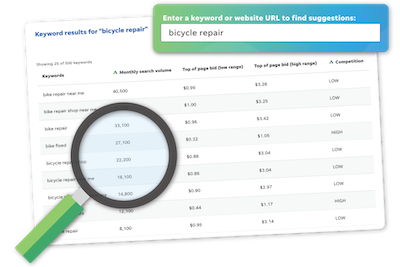Popular Keyword – Vacations Travel Keywords
Search Popular Keywords in Your Industry
These are the most popular suggestions for Vacations Travel Keywords generated by WordStream’s Free Keyword Tool. To get have all of these keywords sent to you, simply enter your Email address and click “Email Keywords” below.
Your keywords are on the way to your inbox!
Vacations Travel Marketing Tips and Tricks
By now, everyone agrees that vacation—and leisure time more broadly—is good for us. Taking a few weeks out of the year to step away from work and recharge the ol’ battery pack does wonders for your mental health, self-esteem, and (once you’re back in the office) productivity. Whether you’re taking the family to Disney World, backpacking through central Europe, or sitting in a canoe in the middle of a quiet lake with a stack of books and lots of beer, vacation is important for consumers.
For marketers, it’s competitive. According to the U.S. Travel Association, domestic and international spend on vacation travel in 2017 exceeded $700 billion. For American travelers specifically, 74% of travel is done for leisure, and the most popular reasons are as follows: visiting family, shopping, visiting friends, fine dining, and rural sightseeing.
Evidently, the demand is there. But, with a long sales cycle and an immense range of choices for consumers, marketers have a challenge on their hands. Let’s discuss some strategies.
We mentioned a long sales cycle, and this is one of the most important things for vacation marketers to keep in mind when crafting their pay-per-click (PPC) advertising campaigns. In an ideal world, an overworked twentysomething would get the idea to spend the weekend in Nashville, see your ad in the Google search results, click on it, and convert.
Alas, that’s not how it works. In fact, according to Google, a prospective vacation traveler may need to interact with different companies hundreds of times before selecting one. Understanding search intent is crucial. Early on, a prospect may search “places to go in southeast Asia.” In this case, it’s not a great idea to use your best, conversion-optimized ad—the unlikelihood of a click means your click-through rate (CTR) takes a hit, which has several bad consequences. For low-intent searches like this one, considering writing blog posts about the researched area. Providing helpful information leaves a good impression on the prospect and makes it more likely that they’ll return to you in the future.
Speaking of which—vacation marketers need to take advantage of remarketing lists for search ads (RLSA). Using RLSA enables you to increase your bid on a particular keyword when one of your remarketing prospects uses it in a search query. In effect, RLSA allows you to turn your advertising efforts up to eleven when your opportunity for converting someone peaks.
It’s imperative that you pay attention to demographics. According to Bing research, when it comes to family vacation research, women conduct 68% of searchers and 69% of clicks. Further, 41% of these searches—nearly half—are conducted by women between the ages of 35 and 49. So, if you’re marketing family vacation destinations—all-inclusive resorts are popular—remember that you’re most likely targeting mothers of young children and teenagers. This means that a headline like “A Tropical Experience the Kids Will Love” should perform better than “A Tropical Experience You’ll Never Forget.”
Vacation travel marketers also need to pay attention to the devices their prospects use at different points in the purchasing process. Speaking generally, people prefer to conduct preliminary research on mobile devices and get down to the serious stuff (purchases and bookings) on desktops and laptops. If your company creates travel-based content (e.g., a blog) that aims to generate top-of-funnel leads, make sure it’s optimized for mobile. Alternatively, the headlines, copy, and landing pages you find work best for conversions should be desktop-focused.
Overall, searches for vacation are at their highest in April. But, depending on which type of vacation you’re marketing, peak search volumes times can vary. Searches for cruises peak in January. Late winter months into spring are the best times to advertise beach vacations. Interest in state and national parks is at its highest in June.
For more travel marketing tips and tricks, read the WordStream blog.
BUSINESS KEYWORDS
- Accounting Keywords
- Affiliate Keywords
- Auto Insurance Keywords
- B2B Ecommerce Keywords
- B2B Keywords
- Biotechnology Keywords
- Business Keywords
- Business Management Keywords
- Business Travel Keywords
- Construction Keywords
- Credit Card Keywords
- Debt Keywords
- Entertainment Keywords
- Finance Keywords
- Human Resources Keywords
- Insurance Business Keywords
- Internet Security Keywords
- Management Keywords
- Office Supplies Keywords
- Online Payment Solutions Keywords
- Software Keywords
- Startup Keywords
- Web Hosting Keywords
CONSUMER KEYWORDS
- Art Keywords
- Automotive Keywords
- Casino Keywords
- Cell Phone Keywords
- Computer Keywords
- Dating Keywords
- Ecommerce Keywords
- Electronics Keywords
- Email Keywords
- Fashion Keywords
- Golf Keywords
- Hotel Keywords
- Internet Keywords
- Jobs Keywords
- Law Keywords
- Mortgage Keywords
- Music Keywords
- Online Stores Keywords
- Pest Control Keywords
- Photography Keywords
- Plumbing Keywords
- Real Estate Keywords
- Restaurants Keywords
- Shoes Keywords
- Travel Keywords
- Wedding Keywords
FINANCE KEYWORDS
HEALTH & WELLNESS KEYWORDS
MISCELLANEOUS KEYWORDS
- Aerospace Keywords
- Agriculture Keywords
- Best Travel Keywords
- Coffee Keywords
- Dog Training Keywords
- Education Keywords
- Environmental Keywords
- Food & Beverage Keywords
- Forex Keywords
- Gifts Keywords
- Home Based Business Keywords
- Home Improvements Keywords
- Internet Games Keywords
- iPhone Keywords
- Jewelry Keywords
- Landscaping Keywords
- Legal Keywords
- Luggage Keywords
- Pharmaceutical Keywords
- Poker Keywords
- Retail Keywords
- School Education Keywords
- Solar Energy Keywords
- Transporation Keywords
- Women Fashion Keywords
- Work From Home Keywords

